men
 One of the funniest parts of a movie or television program is the bloopers…the many takes that were completely blown. We have all laughed at the hilarity of it all. Well, in my years of writing, I can tell you that movies and television programs aren’t the only places that one finds bloopers. Normally, I proofread my stories before I post them, and I usually catch most errors. Nevertheless, like most editors, it pays to have a backup plan. For me, that backup plan is some of my readers. My sister, Cheryl Masterson is my main backup proofreader, and she has picked up some doozies!!
One of the funniest parts of a movie or television program is the bloopers…the many takes that were completely blown. We have all laughed at the hilarity of it all. Well, in my years of writing, I can tell you that movies and television programs aren’t the only places that one finds bloopers. Normally, I proofread my stories before I post them, and I usually catch most errors. Nevertheless, like most editors, it pays to have a backup plan. For me, that backup plan is some of my readers. My sister, Cheryl Masterson is my main backup proofreader, and she has picked up some doozies!!
From botched math, resulting in the wrong age being listed for one of the subjects, such as saying that my Uncle George was 94, when in reality he was 92, to botched spellcheck resulting in a totally wrong word in a sentence making it say something completely wrong and usually goofy, Cheryl has seen it all. She caught one the other day, where I called my Aunt Evelyn…Aunt Evenly. Invariably, I will get a text telling me that I have a blooper in my story. I am grateful that Cheryl usually reads my story pretty quickly after I post it, meaning that a minimal number of people have seen that embarrassing blooper. Nevertheless, some have seen it and I’m sure they laughed  about some of them. Sometimes it isn’t really a blooper, but rather calling something a name that could embarrass the subject. Such was the case with a story about my great grand niece who loves lip balm. It was ok to call it lip balm, until I said it belonged to her daddy. After that I was informed that it was chap stick, because men would never use lip balm. Hahahahaha!! Needless to say, my sister missed that one, but her daughter Chantel Balcerzak and grandson, Jake Harman certainly didn’t.
about some of them. Sometimes it isn’t really a blooper, but rather calling something a name that could embarrass the subject. Such was the case with a story about my great grand niece who loves lip balm. It was ok to call it lip balm, until I said it belonged to her daddy. After that I was informed that it was chap stick, because men would never use lip balm. Hahahahaha!! Needless to say, my sister missed that one, but her daughter Chantel Balcerzak and grandson, Jake Harman certainly didn’t.
Every year I have bloopers in my stories. It is inevitable, l suppose. Then, a few days ago Cheryl suggested that I should write a story about the bloopers. I must say that I was intrigued with the idea. Of course, if I am to continue a yearly blooper story, I will have to keep better track of the many bloopers for the year. Whether I am able to relay them all to my readers or not, I know that for those who catch them, and for me, the bloopers do add a little laughter to my blogs and my days.
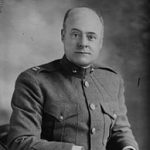 Anthony Joseph Drexel Biddle I (1874–1948) was an eccentric millionaire whose fortune allowed him to pursue theatricals, self-published writing, athletics, and Christianity on a full-time basis. He was the man upon whom the book “My Philadelphia Father” and the play and film “The Happiest Millionaire” were based, but even before that Biddle was eccentric…to say the least. Biddle was a trainer in hand-to-hand combat in both World War I and World War II. In fact, Biddle was an expert in hand-to-hand combat. He also had an unusual way of training his men. It was not unusual for Biddle to tell his trainees to attempt to kill him!! I can’t say for sure that he allowed them to use live ammunition, but he did give them “chance” to try to kill him before he could disarm them.
Anthony Joseph Drexel Biddle I (1874–1948) was an eccentric millionaire whose fortune allowed him to pursue theatricals, self-published writing, athletics, and Christianity on a full-time basis. He was the man upon whom the book “My Philadelphia Father” and the play and film “The Happiest Millionaire” were based, but even before that Biddle was eccentric…to say the least. Biddle was a trainer in hand-to-hand combat in both World War I and World War II. In fact, Biddle was an expert in hand-to-hand combat. He also had an unusual way of training his men. It was not unusual for Biddle to tell his trainees to attempt to kill him!! I can’t say for sure that he allowed them to use live ammunition, but he did give them “chance” to try to kill him before he could disarm them.
An officer in the United States Marine Corps, Biddle was an expert in close-quarters fighting and the author of “Do or Die: A Supplementary Manual on Individual Combat,” a book on combat methods, including knives and empty-hand skills, training both the United States Marine Corps in two world wars and Special Agents of the Federal Bureau of Investigation. He was considered not just an expert in fighting, but also a pioneer of United States Marine Corps training in the bayonet and hand-to-hand combat. He based his style on fencing, though this approach was sometimes criticized as being unrealistic for military combat. At one point, when it looked like there was no way out of a drill he assigned to his men…they were surrounding him, and for all intents and 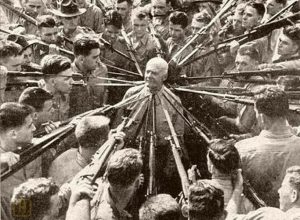 purposes, they had him. Nevertheless, the outcome was not what anyone would have expected, because within in a few minutes, Biddle had completely disarmed each and every one of the men.
purposes, they had him. Nevertheless, the outcome was not what anyone would have expected, because within in a few minutes, Biddle had completely disarmed each and every one of the men.
Born on October 1, 1874 in Philadelphia, Pennsylvania, to Edward Biddle II and Emily Drexel, Anthony was grandson of banker Anthony Joseph Drexel, and great-grandson of banker Nicholas Biddle. Biddle was a graduate of Germany’s Heidelberg University. He was a fellow of the American Geographical Society and founded a movement called “Athletic Christianity” that eventually attracted 300,000 members around the world. A 1955 Sports Illustrated article called him “boxing’s greatest amateur” as well as a “major factor in the re-establishment of boxing as a legal and, at that time, estimable sport.” He joined the Marines in 1917 at the age of 41, and convinced his superiors to include boxing in Marine Corps recruit training. In 1919, he was promoted to the rank of major, and became a lieutenant colonel in 1934. In Lansdowne, Pennsylvania, right outside of Philadelphia, Biddle opened a military training facility, where he trained 4,000 men. His training included long hours of calisthenics and gymnastics, and taught skills such as machete, saber, dagger, bayonet combat, hand grenade use, boxing, wrestling, savate and jiujitsu. He also served two years in the National Guard.
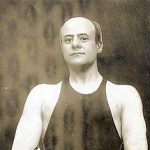 In 1895, he married Cordelia Rundell Bradley. Their marriage was blessed with three children, Anthony Joseph Drexel Biddle Jr. (1897–1961), who married Mary Duke (1887–1960). They were the parents of Mary Duke Biddle (1920–2012) and Nicholas Benjamin Duke Biddle. Their second child was Cordelia Drexel Biddle (1898–1984), who married Angier Buchanan Duke (1884–1923), the son of Benjamin Newton Duke. They were the parents of Angier Biddle Duke (1915–1995) and Anthony Drexel Duke (1918-2014). Their third child was Livingston Ludlow Biddle (1899–1981), who married Kate Raboteau Page (b. 1903), daughter of Robert N. Page. They were the parents of Livingston Ludlow Biddle III. Biddle died May 27, 1948 from a cerebral hemorrhage and uremic poisoning.
In 1895, he married Cordelia Rundell Bradley. Their marriage was blessed with three children, Anthony Joseph Drexel Biddle Jr. (1897–1961), who married Mary Duke (1887–1960). They were the parents of Mary Duke Biddle (1920–2012) and Nicholas Benjamin Duke Biddle. Their second child was Cordelia Drexel Biddle (1898–1984), who married Angier Buchanan Duke (1884–1923), the son of Benjamin Newton Duke. They were the parents of Angier Biddle Duke (1915–1995) and Anthony Drexel Duke (1918-2014). Their third child was Livingston Ludlow Biddle (1899–1981), who married Kate Raboteau Page (b. 1903), daughter of Robert N. Page. They were the parents of Livingston Ludlow Biddle III. Biddle died May 27, 1948 from a cerebral hemorrhage and uremic poisoning.
 Obscene language has not always been the norm where language is concerned, and in fact I don’t think most people talked that way even in the not so distant past of the Old West…certainly not in the way Hollywood would have us believe. Those were different times, and to hear the actors dropping the “f bomb” or the “s word” would be…almost laughable if it weren’t for the fact that it should be insulting. I’m not prudish, and I know that things have changed over the years, but when I hear someone cussing at their children, or using cuss words as, just another part of the conversation, I am sometimes shocked and offended. I don’t like to be one of those people who are offended by just everything, but perhaps if we were offended by obscene language, some of the much more shocking things that go on in our world wouldn’t be happening at all. When the Dick Van Dyke Show was on television, the couple had twin beds and the word pregnant couldn’t even be said on television. We all knew that most couples don’t have separate beds or separate rooms, but it went to show the more wholesome, clean cut, decent world we lived in then.
Obscene language has not always been the norm where language is concerned, and in fact I don’t think most people talked that way even in the not so distant past of the Old West…certainly not in the way Hollywood would have us believe. Those were different times, and to hear the actors dropping the “f bomb” or the “s word” would be…almost laughable if it weren’t for the fact that it should be insulting. I’m not prudish, and I know that things have changed over the years, but when I hear someone cussing at their children, or using cuss words as, just another part of the conversation, I am sometimes shocked and offended. I don’t like to be one of those people who are offended by just everything, but perhaps if we were offended by obscene language, some of the much more shocking things that go on in our world wouldn’t be happening at all. When the Dick Van Dyke Show was on television, the couple had twin beds and the word pregnant couldn’t even be said on television. We all knew that most couples don’t have separate beds or separate rooms, but it went to show the more wholesome, clean cut, decent world we lived in then.

By the 1920s, it seemed to begin to be understood that men, anyway, were going to use foul language at times, but they had better watch their mouth in front of the ladies, because it was a law that they not offend those ladylike ears with such harsh words. In fact, on October 8, 1921, a man was charged of speaking offensively in front of a lady and found guilty for using obscene language in front of a woman in Ohio. Now, if you could be fined or sent to spend a few days in jail for using foul language in front of a woman, I think people would be much more likely to watch their tongue. In my parents home, foul language would result in having your mouth washed out with soap. I guess that somehow Mom thought that would clean up the language, and in reality, it did. I don’t say that my sisters and I never used cuss words as teenagers, because everyone goes through rebellious times, but I can tell you that we did not do it in front of our parents, and our boyfriends were told that they had better not talk that way either, if they wanted to continue to date our parents daughter. Cussing was one of the fastest ways for a guy to get on the wrong side of our parents.

These days, it seems that everyone cusses, including children. I hear some of the things coming out of the mouths of little kids, and I almost can’t help having my jaw drop to the floor. Television shows consider some language as being acceptable, and then amazingly they bleep out other words that are not any worse than the ones they have allowed. Obscene gestures are the normal way to tell everyone in sight that you are not happy with what is going on around you, and screaming obscenities is the newest way to express your disgust. Some people have wondered if “swearing is a sign of a limited vocabulary” or is it just a way of “obscenitizing” our world. Either way I find that the loss of eloquent speech is very sad indeed.
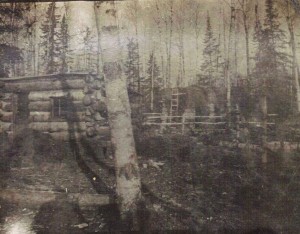 For a time, my grandfather, Allen Luther Spencer, worked in the lumber business. It started when he and my grandmother’s brother, Albert Schumacher, decided to go trapping in northern Minnesota. That venture didn’t go very well, and they just about froze to death. It was at that time that they decided to go into the lumber business. Being a lumberjack is no easy job, and was probably much more dangerous in my grandfather’s day, than it is now. Back then, lumberjacks, as they were called did everything from chopping down the trees, to cutting them with a saw, climbing up in the tree to get to the top. You name it, if it pertained to logging, they did it. They called it harvesting, and it begins with the lumberjack. The term lumberjack is not a term that is used much
For a time, my grandfather, Allen Luther Spencer, worked in the lumber business. It started when he and my grandmother’s brother, Albert Schumacher, decided to go trapping in northern Minnesota. That venture didn’t go very well, and they just about froze to death. It was at that time that they decided to go into the lumber business. Being a lumberjack is no easy job, and was probably much more dangerous in my grandfather’s day, than it is now. Back then, lumberjacks, as they were called did everything from chopping down the trees, to cutting them with a saw, climbing up in the tree to get to the top. You name it, if it pertained to logging, they did it. They called it harvesting, and it begins with the lumberjack. The term lumberjack is not a term that is used much 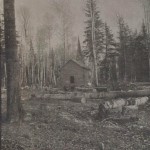 these days, because the modern way of harvesting is very different. Lumberjacks were pretty much a pre-1945 term. Hand tools were the harvest tools used, because there were no machines like what we have now.
these days, because the modern way of harvesting is very different. Lumberjacks were pretty much a pre-1945 term. Hand tools were the harvest tools used, because there were no machines like what we have now.
The actual work of a lumberjack was difficult, dangerous, intermittent, low-paying, and primitive in living conditions, but the men built a traditional culture that celebrated strength, masculinity, confrontation with danger, and resistance to modernization. These days, there are a few people who actually celebrate the lumberjacking trade. Mostly it involves competitions, but just by watching, you can see that being a lumberjack was not a job for a weakling.
Lumberjacks, and their families, usually lived in a lumber camp, moving from site to site and the job moved. I 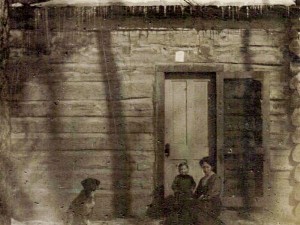 know that my grandmother and my Aunt Laura spent time in the lumber camps. From what I’ve been told, the houses were little more that a log tent. They didn’t stay very warm, because there were gaps in the walls, and my guess is that they could only use a certain amount of wood a day, so it didn’t eat into the profits. I suppose that the owner of the logging operation made a good profit, but that doesn’t mean that the people who worked for them made a great deal of money, because they really didn’t. Being a lumberjack was really a far from glamorous occupation, and like most really physical jobs, not one that a man can do for too many years. Before long, my grandfather, like most lumberjacks, moved on to other jobs, in grandpa’s case the railroad.
know that my grandmother and my Aunt Laura spent time in the lumber camps. From what I’ve been told, the houses were little more that a log tent. They didn’t stay very warm, because there were gaps in the walls, and my guess is that they could only use a certain amount of wood a day, so it didn’t eat into the profits. I suppose that the owner of the logging operation made a good profit, but that doesn’t mean that the people who worked for them made a great deal of money, because they really didn’t. Being a lumberjack was really a far from glamorous occupation, and like most really physical jobs, not one that a man can do for too many years. Before long, my grandfather, like most lumberjacks, moved on to other jobs, in grandpa’s case the railroad.
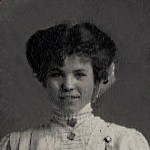 My great aunt, Mina Schumacher Spare really was a remarkable person. I wish I could say that I knew that first hand, but while she was still alive when I was born, I don’t recall if I ever met her. Nevertheless, from her sister, Bertha’s writings, I feel as though I knew her well. Mina was a woman who could see that the world was changing. She knew that women would soon have more of an active role in business, and so she decided that her training should be more that just a teaching certificate, and she encouraged her two younger sisters, Bertha and Elsa to get the same education, which they did. Her wisdom in the choice of training she should have, was what landed her jobs that men had usually held, and she was better at it than they were. Of course, Mina was a smart girl, and that was a rarity at that time. Or perhaps there were other smart girls, but they didn’t let anyone know about it. In many ways, I find that sad. I am not a feminist, and I don’t agree with most of what they do, but I’d think a woman who is smart should be allowed to use her abilities in whatever way she chooses.
My great aunt, Mina Schumacher Spare really was a remarkable person. I wish I could say that I knew that first hand, but while she was still alive when I was born, I don’t recall if I ever met her. Nevertheless, from her sister, Bertha’s writings, I feel as though I knew her well. Mina was a woman who could see that the world was changing. She knew that women would soon have more of an active role in business, and so she decided that her training should be more that just a teaching certificate, and she encouraged her two younger sisters, Bertha and Elsa to get the same education, which they did. Her wisdom in the choice of training she should have, was what landed her jobs that men had usually held, and she was better at it than they were. Of course, Mina was a smart girl, and that was a rarity at that time. Or perhaps there were other smart girls, but they didn’t let anyone know about it. In many ways, I find that sad. I am not a feminist, and I don’t agree with most of what they do, but I’d think a woman who is smart should be allowed to use her abilities in whatever way she chooses.
Mina’s first position was as a Steno-bookkeeper, and she worked office jobs from that time until her retirement with the possible exception of the years when her little daughter, Pauline was born, and then until she went to school. Mina finally retired in 1956, at her husband, John’s insistence. She fought him on the idea of retirement, but once she actually retired, she thoroughly enjoyed herself. Her husband, John joined her in retirement in 1963, and they moved to Boulder, Colorado to be closer to their daughter, Pauline (Paula) and her family. Their retired freedom was now ahead of them, but in reality, the time for blissful freedom would be short. Like her mother, Mina had Rheumatoid Arthritis. Mina passed away September 30, 1970, just seven short years after John retired.
After Mina’s passing, Bertha and Elsa had also moved to Boulder, and actually lived right next door to John, but years later, when John spoke of the anguish he felt after Mina’s passing, they were shocked. These were things John had kept to himself all that time. When he finally spoke of it, John said, “I would never have amounted to 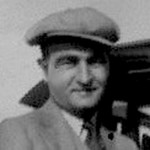 a ‘darn’ if it hadn’t been for Min.” And years later, in 1981, he said, “For the first four years after she was gone, I thought sometimes I couldn’t stand it. I would stay down stairs, where there were no memories. Upstairs I would see her everywhere.” You see, Mina was unable to navigate the stairs the last two years of her life. All her things were upstairs in the end. John’s heart was so in tuned to Mina’s, that he felt like he was left just half a man without her presence. I know many people feel like they almost can’t take it when their spouse passes away, but somehow, for John, it seemed more truth that just a feeling. Nevertheless, John knew that Mina wouldn’t have wanted him to just lay down and die, so he went on to live a full life. He passed away in 1986, and went to join his beloved Min. On their grave are these fitting words, Together Forever.
a ‘darn’ if it hadn’t been for Min.” And years later, in 1981, he said, “For the first four years after she was gone, I thought sometimes I couldn’t stand it. I would stay down stairs, where there were no memories. Upstairs I would see her everywhere.” You see, Mina was unable to navigate the stairs the last two years of her life. All her things were upstairs in the end. John’s heart was so in tuned to Mina’s, that he felt like he was left just half a man without her presence. I know many people feel like they almost can’t take it when their spouse passes away, but somehow, for John, it seemed more truth that just a feeling. Nevertheless, John knew that Mina wouldn’t have wanted him to just lay down and die, so he went on to live a full life. He passed away in 1986, and went to join his beloved Min. On their grave are these fitting words, Together Forever.
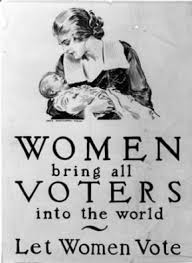 I’m sure that most people who are from Wyoming have heard it said that Wyoming is about 20 years behind the times. I suppose that in some ways we are, and I don’t think that is always a bad thing. If we are twenty years behind everyone else on crime, for instance, I’m happy. I’ll admit that for anyone who is looking for the latest styles or latest gadget…well, it can take a little longer to get to Wyoming. Nevertheless, Wyoming hasn’t always been 20 years behind the times. In fact, on this day, December 10, 1869, Wyoming stepped out ahead of the pack, when the Wyoming territorial legislators passed a bill that was signed into law, giving women the right to vote.
I’m sure that most people who are from Wyoming have heard it said that Wyoming is about 20 years behind the times. I suppose that in some ways we are, and I don’t think that is always a bad thing. If we are twenty years behind everyone else on crime, for instance, I’m happy. I’ll admit that for anyone who is looking for the latest styles or latest gadget…well, it can take a little longer to get to Wyoming. Nevertheless, Wyoming hasn’t always been 20 years behind the times. In fact, on this day, December 10, 1869, Wyoming stepped out ahead of the pack, when the Wyoming territorial legislators passed a bill that was signed into law, giving women the right to vote.
Many people have speculated that the legislators did not have the best motives for passing the piece of legislation. People speculated that while everyone knew the importance women played in the settlement of the west, they felt that it was really to bolster the strength of the conservative voters. Others will tell you that it was done because the 6,000 adult men were lonely. By making it legal for women to vote, they hoped it would bring in more women, because the 1,000 women in the territory was not a good number when it came to courting. They hoped that the right to vote would be a big draw to women who wanted equal rights.
I can’t say for sure what the real reason was to pass the legislation, but if you ask me, Wyoming was ahead of its time for once. Another group of people who wanted women’s rights wanted it simply because it was the right thing to do. William Bright, who was one of the territorial legislators, who was in his mid-forties, and had a very persuasive wife, was convinced by his wife that denying women the right to vote, was a gross injustice. The other major backer, Edward M. Lee, the territorial secretary who had championed the cause for years, 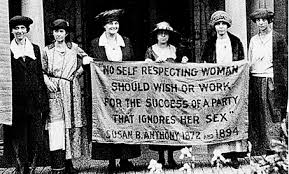 argued that it was unfair for his mother to be denied a privilege granted to African American males. I’m not sure if he should have used that analogy exactly, but the truth is that he was right. If one citizen is allowed to vote, then all citizens who are of age should be allowed to vote.
argued that it was unfair for his mother to be denied a privilege granted to African American males. I’m not sure if he should have used that analogy exactly, but the truth is that he was right. If one citizen is allowed to vote, then all citizens who are of age should be allowed to vote.
I don’t really think that the reasons behind the move to give women the right to vote matter so much as the fact that it happened. I don’t believe in one citizen having for rights, and others who should really have that right too, but are denied. Maybe Wyoming is behind the times in many ways, but is some of the most important ways, they are ahead of their time.
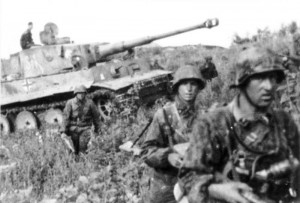 When the Germans invaded the Soviet Union in early July of 1943, they concentrated their forces near the city of Kursk in Western Russia. This was the site of a 150 mile wide Soviet resistance pocket that jutted 100 miles into the German lines. When the attack began on July 5th, the Germans had 38 divisions, of which, nearly half were armored. The Germans began their attack coming in from the north and the south, in an effort to cut off and surround the Soviet troops. Unfortunately for them, they had sorely misjudged the Soviet forces. Even though the Soviets were not really prepared for this invasion, they did have better tanks and air support than they had in previous battles. The fighting was bitter, but soon the Soviets had destroyed as much as 40 percent of the German armor, which included their new Mark VI Tiger tanks. I’m sure this must have been a shock to the Germans, who thought this tank was going to be their best tank ever, but like the Bismarck back in 1941, they found out that these new tanks were no match for what the Russians brought out.
When the Germans invaded the Soviet Union in early July of 1943, they concentrated their forces near the city of Kursk in Western Russia. This was the site of a 150 mile wide Soviet resistance pocket that jutted 100 miles into the German lines. When the attack began on July 5th, the Germans had 38 divisions, of which, nearly half were armored. The Germans began their attack coming in from the north and the south, in an effort to cut off and surround the Soviet troops. Unfortunately for them, they had sorely misjudged the Soviet forces. Even though the Soviets were not really prepared for this invasion, they did have better tanks and air support than they had in previous battles. The fighting was bitter, but soon the Soviets had destroyed as much as 40 percent of the German armor, which included their new Mark VI Tiger tanks. I’m sure this must have been a shock to the Germans, who thought this tank was going to be their best tank ever, but like the Bismarck back in 1941, they found out that these new tanks were no match for what the Russians brought out.

The Battle of Kursk was quite the battle. It involved 6,300 tanks, two million men, and 5,000 aircraft. It would be the largest tank battle in history, and it would end with the German offensive being driven back by the Soviets. The cost to the Germans was heavy, and the battle would be the beginning of the end for the Germans in Russia. The retreated as far as they were allowed, but Hitler was not really willing to let the retreat much. It was just another part of his insanity. He thought he could outlast the Russians. He had not learned from Bismarck or from Napoleon. It’s not surprising really. Hitler’s insanity honestly made him believe that he was invincible, a fatal mistake…at least in that he couldn’t accept the ultimate failure and so took his own life. The Battle of Kursk ended on July 13, 1943, and it did indeed mark the beginning of the end of the German invasion of Russia.
When I think of wars, for some reason I don’t think of tanks. Oh, I have seen the war movies and all, but tanks just seem clunky and awkward, and so not an efficient weapon of war in my mind. I suppose that if I know as much about tanks as my brother-in-law, Ron Schulenberg, who served in Desert Storm and was trained in the 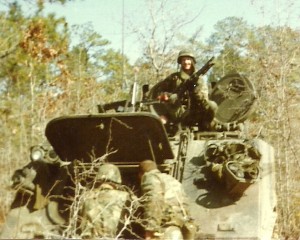 use of tanks knows, I might think they were more of a serious weapon. That is something I might have to discuss with him in the near future. The weapons used in wars are varied, and each one serves a purpose. Of course, each side tries to come up with a weapon that is far better than their opponent, and in the end, it is a matter of having the best weapon between the two enemies, and which side is able to use the weapons available to them. On this day, July 13, 1943 the Germans found out that the weapons the Russians had and their ability to use them would prove to be the undoing of their invasion. In the beginning of August, the Soviets began a major offensive around the Kursk area, and within weeks the Germans were in retreat all along the eastern front.
use of tanks knows, I might think they were more of a serious weapon. That is something I might have to discuss with him in the near future. The weapons used in wars are varied, and each one serves a purpose. Of course, each side tries to come up with a weapon that is far better than their opponent, and in the end, it is a matter of having the best weapon between the two enemies, and which side is able to use the weapons available to them. On this day, July 13, 1943 the Germans found out that the weapons the Russians had and their ability to use them would prove to be the undoing of their invasion. In the beginning of August, the Soviets began a major offensive around the Kursk area, and within weeks the Germans were in retreat all along the eastern front.
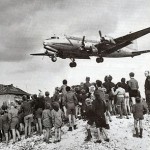 I think that every nation has opportunities to do what can be labeled as defining moments…situations when the nation dealt with an enemy or situation so well, that it can only be considered amazing. That was how the United States reacted to one of the most dramatic standoffs in the history of the Cold War. The Soviet Union decided to block off all road and rail traffic to and from West Berlin, Germany. The move was designed to basically starve the people into submission…or at least that was the plan. It was also a move that would be in defiance to all the other allies in Germany at the time. Unfortunately for the Soviet Union, the blockade turned out to be a horrible diplomatic move, but for the United States, it became a defining moment. The United States emerged from the confrontation with a renewed purpose and confidence, as well as a reputation for being a humanitarian nation.
I think that every nation has opportunities to do what can be labeled as defining moments…situations when the nation dealt with an enemy or situation so well, that it can only be considered amazing. That was how the United States reacted to one of the most dramatic standoffs in the history of the Cold War. The Soviet Union decided to block off all road and rail traffic to and from West Berlin, Germany. The move was designed to basically starve the people into submission…or at least that was the plan. It was also a move that would be in defiance to all the other allies in Germany at the time. Unfortunately for the Soviet Union, the blockade turned out to be a horrible diplomatic move, but for the United States, it became a defining moment. The United States emerged from the confrontation with a renewed purpose and confidence, as well as a reputation for being a humanitarian nation.
When World War II ended, Germany was divided into occupation zones. The United States, Great Britain, the Soviet Union, and eventually France were granted specific zones to occupy. Each nation was there to accept the surrender of Nazi forces and restore order. The Soviet Union occupied most of eastern Germany, and the other 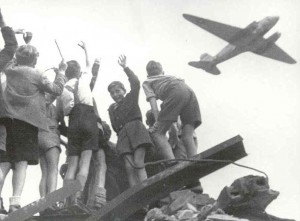 Allied nations occupied western Germany. The German capital of Berlin was divided into four sections as well. The differences between the United States and the Soviet Union were immediately evident. The Soviets were intent on thoroughly breaking the Germans…making them neutral and disarmed. Punishment was going to be at the top of the list. The United States saw things differently. They believed that the economic recovery of Western Europe depended of a strong, reunified Germany. The United States also felt that a rearmed Germany was going to be a stiff deterrent to further Soviet expansion into Western Europe. In May 1946, the Americans stopped reparations shipments from their zone to the Soviets. In December, the British and Americans combined their zones; the French joined some months later. The Soviets viewed these actions as a threat and issued more demands for more say in the economic future of Germany. On June 22, 1948, negotiations between the Soviets, Americans, and British broke down. On June 24, Soviet forces blocked the roads and railroad lines into West Berlin.
Allied nations occupied western Germany. The German capital of Berlin was divided into four sections as well. The differences between the United States and the Soviet Union were immediately evident. The Soviets were intent on thoroughly breaking the Germans…making them neutral and disarmed. Punishment was going to be at the top of the list. The United States saw things differently. They believed that the economic recovery of Western Europe depended of a strong, reunified Germany. The United States also felt that a rearmed Germany was going to be a stiff deterrent to further Soviet expansion into Western Europe. In May 1946, the Americans stopped reparations shipments from their zone to the Soviets. In December, the British and Americans combined their zones; the French joined some months later. The Soviets viewed these actions as a threat and issued more demands for more say in the economic future of Germany. On June 22, 1948, negotiations between the Soviets, Americans, and British broke down. On June 24, Soviet forces blocked the roads and railroad lines into West Berlin.
When the Soviets blocked the roads and railways, the Americans were furious. The question now became, what to do about it. Inside West Berlin there was panic. The people thought they were going to die. For a few tense 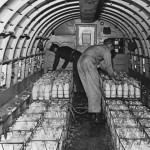 days, the world waited to see what the United States would do next. Then, just two days after the Soviets began the blockade, the United States reacted in a way that was so unexpected, and in the end, it would be a way that brought about that defining moment, and really set the stage for the humanitarian reputation the United States has today. A massive airlift of supplies was sent into West Berlin in what would become one of the greatest logistical efforts in history. For the Soviets, the escapade quickly became a diplomatic embarrassment. They looked like an international bully that was trying to starve men, women, and children into submission. The successful American airlift merely served to accentuate the technological superiority of the United States over the Soviet Union. On May 12, 1949, the Soviets officially ended the blockade.
days, the world waited to see what the United States would do next. Then, just two days after the Soviets began the blockade, the United States reacted in a way that was so unexpected, and in the end, it would be a way that brought about that defining moment, and really set the stage for the humanitarian reputation the United States has today. A massive airlift of supplies was sent into West Berlin in what would become one of the greatest logistical efforts in history. For the Soviets, the escapade quickly became a diplomatic embarrassment. They looked like an international bully that was trying to starve men, women, and children into submission. The successful American airlift merely served to accentuate the technological superiority of the United States over the Soviet Union. On May 12, 1949, the Soviets officially ended the blockade.

 This morning, as my family worked to rake up all the leaves at my mother’s house, I found myself taken back to my childhood years. I remember the many times when my dad would tell all of us girls to get our coats on so we could go out and rake the lawn. I can’t say that it was always the most fun day of our lives, because we really didn’t want to get out there and rake…especially if it was cold outside. Nevertheless, we did as we were told, and like it or not, we raked up all those leaves. These days when we rake Mom’s lawn, we have to tell ourselves that it is time, because Dad isn’t here to get things started. Still, we know that he loved his yard, and he would want it taken care of, so we get out there and take care of it. Today was that day that we told ourselves that the time had come…before the bad weather that is coming on Monday, showed it’s ugly face.
This morning, as my family worked to rake up all the leaves at my mother’s house, I found myself taken back to my childhood years. I remember the many times when my dad would tell all of us girls to get our coats on so we could go out and rake the lawn. I can’t say that it was always the most fun day of our lives, because we really didn’t want to get out there and rake…especially if it was cold outside. Nevertheless, we did as we were told, and like it or not, we raked up all those leaves. These days when we rake Mom’s lawn, we have to tell ourselves that it is time, because Dad isn’t here to get things started. Still, we know that he loved his yard, and he would want it taken care of, so we get out there and take care of it. Today was that day that we told ourselves that the time had come…before the bad weather that is coming on Monday, showed it’s ugly face.

 We usually send out a text to the people that we know we can count on to be there, and Mom and Cheryl provide the breakfast of donuts and a lunch of sandwiches and chips. When all the workers have assembled, the work begins. We normally have three or four men show up too, but this year just didn’t work out. The men were either out of town or working. Thankfully, we had my niece, Jenny Spethman’s boys, Xander, Zack, and Isaac to strong arm the bags full of leaves out to the alley for us. Other than those boys, we girls were the worker bees for the day. We had a great time, laughing and fighting the wind for the leaves. I know that a number of them ended up down the street instead of in the bags, because we had a pretty good wind going.
We usually send out a text to the people that we know we can count on to be there, and Mom and Cheryl provide the breakfast of donuts and a lunch of sandwiches and chips. When all the workers have assembled, the work begins. We normally have three or four men show up too, but this year just didn’t work out. The men were either out of town or working. Thankfully, we had my niece, Jenny Spethman’s boys, Xander, Zack, and Isaac to strong arm the bags full of leaves out to the alley for us. Other than those boys, we girls were the worker bees for the day. We had a great time, laughing and fighting the wind for the leaves. I know that a number of them ended up down the street instead of in the bags, because we had a pretty good wind going.
We had a couple of other helpers that we hadn’t exactly planned on, as well. My niece, Jenny’s daughter, Aleesia, and my niece Jessi Sawdon’s dog, Daisy. I won’t go into a lot of detail, but suffice it to say that the two 
 of them managed to remove as many leaves from the piles as they stuck into them. While Jenny was trying to bag the leaves, Aleesia wanted to help, but instead of putting leaves in the bag, she pushed them the other way…out of the pile. As to Daisy, she thought the leaves were something to pay with…or at least in, so she would jump around in the leaves and try to play with the workers. It was all pretty cute, and despite the distractions, we did manage to get the leaves raked up before lunchtime. It just goes to show you what a few worker bees can do.
of them managed to remove as many leaves from the piles as they stuck into them. While Jenny was trying to bag the leaves, Aleesia wanted to help, but instead of putting leaves in the bag, she pushed them the other way…out of the pile. As to Daisy, she thought the leaves were something to pay with…or at least in, so she would jump around in the leaves and try to play with the workers. It was all pretty cute, and despite the distractions, we did manage to get the leaves raked up before lunchtime. It just goes to show you what a few worker bees can do.

 Monday nights during the school year, basically September to late April or early May, Bob and I bowl on a league at Sunrise Lanes in Casper. There are a few fun things we do there, like bowling poker, pushing nickels, and the high game pot. I don’t often win the poker hand for some reason, but I continue to play anyway. I suppose that the winners vary pretty well, but it does sometimes seem that the same people win a lot. It really doesn’t matter, since it’s only a dollar a game to get in. Obviously, the more cards you get the better your chances of winning, and I’m not a bad bowler, so I usually get enough cards to have a fair shot…since two cards are taken for every strike and converted split, and one for every spare.
Monday nights during the school year, basically September to late April or early May, Bob and I bowl on a league at Sunrise Lanes in Casper. There are a few fun things we do there, like bowling poker, pushing nickels, and the high game pot. I don’t often win the poker hand for some reason, but I continue to play anyway. I suppose that the winners vary pretty well, but it does sometimes seem that the same people win a lot. It really doesn’t matter, since it’s only a dollar a game to get in. Obviously, the more cards you get the better your chances of winning, and I’m not a bad bowler, so I usually get enough cards to have a fair shot…since two cards are taken for every strike and converted split, and one for every spare.
I don’t play poker any other time, but in years past, I played Cribbage with my Uncle Bill when he would visit or we would visit there, and Spades with Bob’s grandfather whenever we would go to visit in Forsyth, Montana. Those are always fond memories for me, because these men were two people that I very much enjoyed spending time with. They were also pretty much the only people who I played cards with…not because I refused to play cards with anyone else, but simply because they were the only ones I knew who really played cards much.
As I was gathering my cards to turn them in at the end of the game at bowling on Monday night, I looked at them, and decided that they were really a particularly bad hand. Almost nothing matched, and nothing lined up for a straight or flush either. Without thinking, I made the comment that I had a hand like a foot. That was something I hadn’t thought of in years. I thought that it was Bob’s grandfather who used to call it that, but then I thought maybe it was my Uncle Bill. I honestly am not sure, but I know that I always thought that was quite funny. Nevertheless, it described the hand that I had quite well.
I haven’t played regular cards in a number of years now, but in many ways, I think I miss that. I know it really isn’t about the card game, but about the time spent with those two dear men. We always related so well to 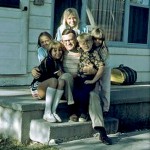
 each other, and I miss the fun times we had. Bob’s grandfather is gone now, having passed away ten years ago on October 22, 2004. While my Uncle Bill is still living, Alzheimer’s Disease has taken many of his memories away from him now, and I am simply thankful that he knew who we were after we told him that we were his brother’s family, when we visited him recently. Cribbage came up, but I’m not sure he would remember how to play anymore. Whichever of these two dear men used to say, a hand like a foot, no longer really matters, because I don’t think I will ever hear that again, except in my own memory.
each other, and I miss the fun times we had. Bob’s grandfather is gone now, having passed away ten years ago on October 22, 2004. While my Uncle Bill is still living, Alzheimer’s Disease has taken many of his memories away from him now, and I am simply thankful that he knew who we were after we told him that we were his brother’s family, when we visited him recently. Cribbage came up, but I’m not sure he would remember how to play anymore. Whichever of these two dear men used to say, a hand like a foot, no longer really matters, because I don’t think I will ever hear that again, except in my own memory.

